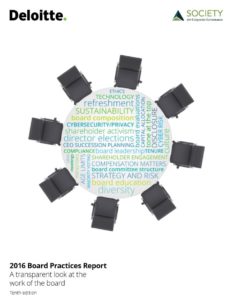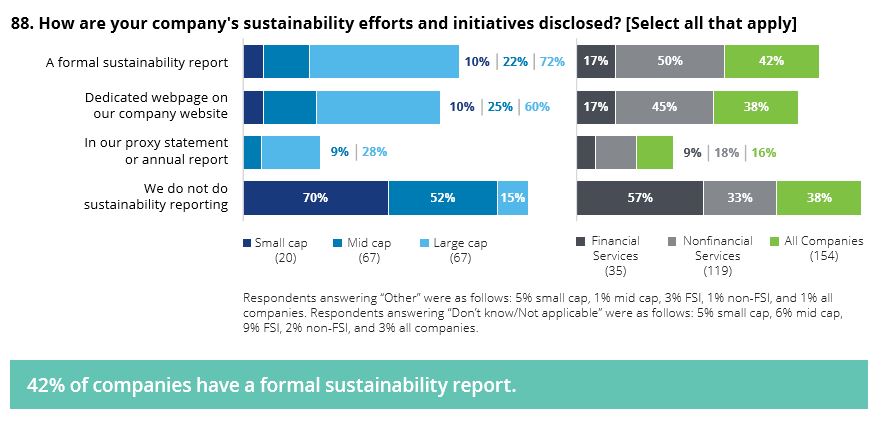
The 2016 Board Practices Report issued by Deloitte’s Center for Board Effectiveness and the Society for Corporate Governance identifies key findings on board-relevant topics that have risen to prominence. Respondents cite strategy as the primary board focus for 2017 – the overwhelming top choice at 80 percent – with risk oversight coming in second at 42 percent. Additionally, boards are preparing for activists, with 74 percent of companies reporting they are discussing how to prepare for activism, up from 55 percent in 2014, and 27 percent of companies reporting they have been approached by an activist in the past year.
“This report helps us to understand how boards navigate the most pressing issues companies face in their current environments,” said Deb DeHaas, Deloitte’s vice chairman and national managing partner, Center for Board Effectiveness and chief inclusion officer. “Boards are working on multiple fronts to more effectively engage with shareholders, develop revised strategies for emerging risks, and re-evaluate board composition as a way to successfully take on these responsibilities.”
Board refreshment and composition are other key focus areas reported by the survey, with 78 percent of respondents having adopted some form of refreshment policy. Nearly two-thirds of respondents reported their boards added a new director in the past year, up from half in 2014. The changes resulted mainly from resignations and planned retirements, though 22 percent attributed the change to keeping the board fresh, and 15 percent reported it was to achieve greater diversity (i.e., gender, race, ethnicity, generation/age). On gender, the survey found that large cap companies have the greatest amount of female directors with 40 percent of respondents having three and 16 percent having four or more. Fifty-two percent of respondent companies have one or two board members of a racial and/or ethnic minority.
When asked about the top risks that the board is focused on, respondents ranked cyber as No. 1. Fifty-four percent reported that the audit committee has primary responsibility for cybersecurity oversight. Perhaps not surprisingly, cyber security/cyber risk was listed as the No. 1 topic of education for audit committees and among the more common topics of full board education. Additionally, 14 percent of respondents noted that they had added a board member with cyber experience in the past two years.
Eighty percent of respondents reported that boards will spend time on strategy this year. Forty-six percent of large cap companies and more than 40 percent of all companies monitor progress against the company’s strategic plan at every board meeting.
“Companies continue to grapple with complex operational, economic and geopolitical risks,” said Darla Stuckey, president and chief executive officer of the Society for Corporate Governance. “It is vital for boards to work with management to navigate risks and opportunities with a comprehensive and adaptable strategy. This is why we see those surveyed emphasizing the amount of time they dedicate to developing and executing a resilient strategy.”
Additional findings revealed in the survey include:
- Sustainability: With an increasing focus on sustainability practices from investors and shareholders, sustainability reporting is an important focus for boards, with nearly 60 percent of companies providing some form of sustainability disclosure and 42 percent providing a formal report.
- Board education: Top board education topics include specific board or governance issues; industry-specific topics; fiduciary duties and responsibilities; cybersecurity and cyber risk; and company policies.
- Shareholder sentiment: Fifty-five percent of all boards and 62 percent of large cap boards are being updated on shareholder sentiment and concerns more than once a year.
Results from the 2016 Board Practices Report are based on the responses from 189 individuals from the Society’s membership. This is the 10th edition of the Board Practices Report. It presents findings from a survey distributed in the third quarter of 2016 to the public company members of the Society. The survey covered over 15 areas of board practices and hot topics, and included 99 questions. Survey results are presented by market capitalization, by financial services and non-financial services industries, and by all companies in total.
The Center for Board Effectiveness helps directors deliver value to the organizations they serve through a portfolio of high quality, innovative experiences throughout their tenure as board members. Whether an individual is aspiring to board participation or a veteran of many board experiences, the Center’s programs enable them to contribute effectively and provide focus in the areas of governance and audit, strategy, risk, innovation, compensation and succession.




